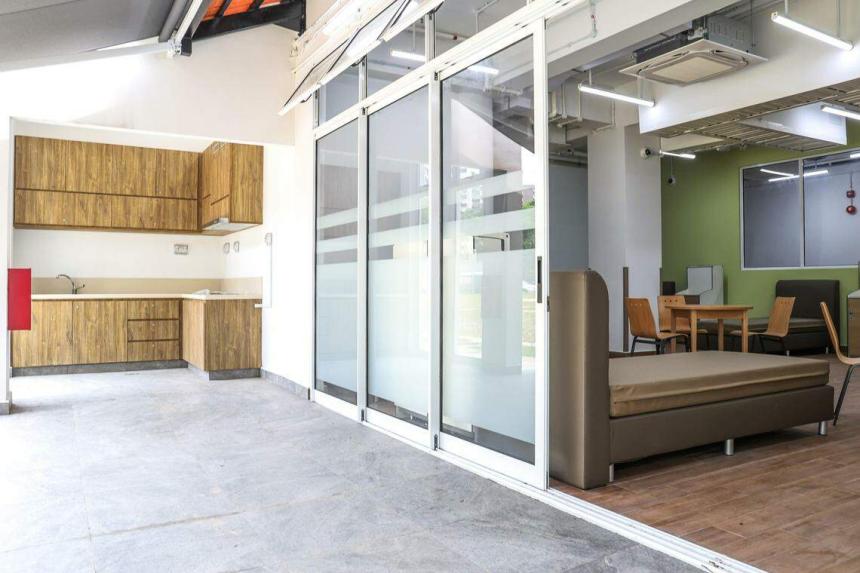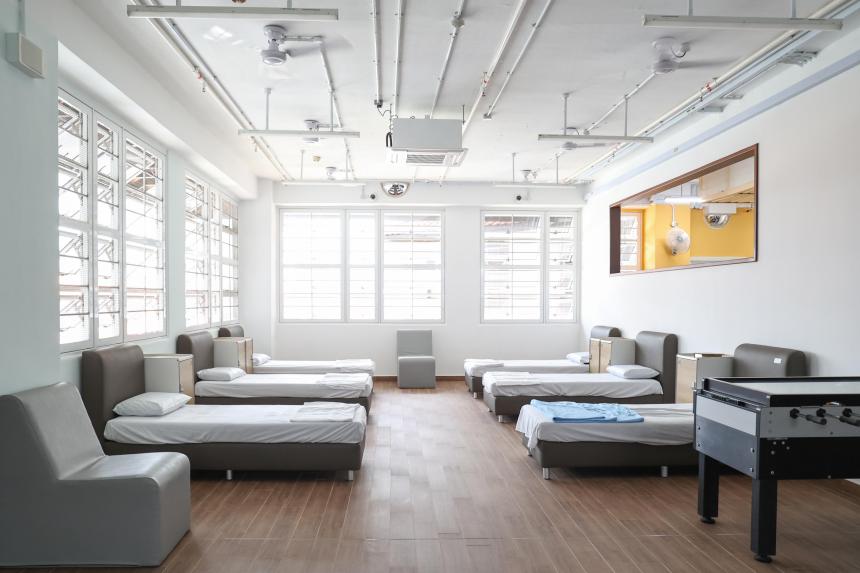SINGAPORE - The Institute of Mental Health (IMH) has overhauled 11 acute wards in its biggest refurbishment project since 1993, when the IMH campus was built in Buangkok.
This shows IMH’s increased focus on helping patients regain control of their lives and emotions so they can lead meaningful lives back in the community, Associate Professor Swapna Verma, IMH’s medical board chairwoman, said during a media briefing on Monday.
The remodelling of the wards is part of a Ministry of Health-funded project that started in 2018.
“We don’t just alleviate patients’ medical symptoms. We address their psychosocial needs as well, because these have an intertwining effect on their recovery,” Associate Professor Daniel Fung, IMH chief executive, said on Friday.
Two of the refurbished wards, Stepping Stones Rehabilitation Centre and addiction medicine ward Serenity Centre, officially opened on Friday, with Health Minister Ong Ye Kung giving the opening address.
The recovery-focused model of care the hospital has embraced is evident in Stepping Stones, a 100-bed facility that was created from the merging of two wards.
Patients in the open-concept ward undergo a voluntary eight-week programme – led by nurses and allied health professionals – to get them ready for life in the community. They get help with identifying and working on personal goals, such as preparing themselves for independent living or getting a job. They can also prepare simple meals in the kitchenette, do the laundry, and pick up life and job training skills.
Stepping Stones residents sleep on single beds similar to those found in private homes, and have work trial opportunities within the hospital involving kitchen work, cleaning and hydroponics farming, among others.
“If you look at any kind of psychiatric illness, it is a neurological illness. There is a physical brain impairment and... it takes time to recover,” said Prof Swapna.
“So, similarly, as you have rehab in the acute medical or surgical setting, you need to have rehab wards even in psychiatric settings.”

Previously, rehabilitation of mental patients was somewhat constrained by typical ward settings and could involve them being referred to community partners after discharge – sometimes too soon, she said.
All public acute care hospitals in Singapore provide general psychiatric inpatient and outpatient services, but IMH is the only specialised psychiatric hospital, with 48 wards and 1,950 beds.
Four wards were refurbished between 2014 and 2016 and turned into specialty wards, including dementia-friendly ones.
In addition to Stepping Stones and Serenity Centre, IMH’s refurbished acute care wards include a 30-bed short stay unit which opened in early 2022, a child and adolescent ward, and six general psychiatry wards.
IMH has evolved into a tertiary institution with sub-speciality clinical services and a research focus, Mr Ong said on Friday, adding that the hospital also trains future mental health care professionals, builds capability among community partners and raises mental health literacy in the population.

It takes care of about 52,000 outpatients each year across seven clinics as well as in the community, and 1,800 inpatients, of whom many are long stayers.
Many of them stay for years and even decades, as a result of IMH’s history of custodial care for mental health patients, Mr Ong said.
Prof Swapna told the media earlier that previously, IMH focused on managing acute symptoms, so “if the patients had delusions, hallucinations, if their moods were depressed, we got that better”.
“But,” she noted, “many times, patients also have what we call cognitive problems, that is difficulty with higher-level cognitive thinking, and psychosocial problems – in socialising, in making friends in the community, in holding jobs.
“So, all that needs to be a part of their care plan, and only then can we truly reintegrate them into the community.” She added: “We want to transition from offering institutional-based care to community-based care because hospitals should just be a small part of that journey.”

At the refurbished general psychiatric wards, patients can now prepare meals in kitchenettes and engage in gardening at the adjoining sky terrace during an average stay of three to four weeks.
These are patients who may be recently diagnosed or experiencing a relapse of their mental health conditions. After their acute symptoms are alleviated with medication, they may go through psychosocial or occupational therapy.
These wards have multi-purpose rooms, where care teams, patients, families and social service agencies can gather to chart the patient’s discharge plan.
The care transformation at IMH is taking place amid pent-up demand following the Covid-19 pandemic and growing awareness.
Prof Swapna said IMH is looking into allowing some patients to attend day programmes when Stepping Stones, now 68 per cent full, is filled up.
With the enhanced facilities, IMH can offer a higher level of differentiated care to patients.
The Short Stay Unit, for instance, is for those experiencing behavioural and psychosocial changes in reaction to distressing crises such as a break-up, and who may otherwise not have an existing mental health condition.
There, a nurse is assigned to each patient to help them and prevent their condition from worsening. They stay no longer than 72 hours, and will be transferred to an acute ward if needed.
The addiction ward has 30 detoxification beds and 10 rehabilitation ones.
Patients in rehab undergo a programme that addresses the psychological, emotional and behavioural aspects of addiction with intensive therapy counselling, and includes aftercare planning in the community.
“We strongly believe – and research has shown (this is the case) – that patients with mental illness can recover and reclaim their lives,” said Prof Swapna.
IMH is also expanding its capacity to help with efforts in preventive work and education, Prof Fung said on Friday. The key is to have a community that is ready to provide mental health support, he added.



